The Best Herbal Tea Blend for Headaches
Do you ever experience the pounding, throbbing agony of headache pain? Whether you suffer from tension headaches, migraines, or another type of headache, you’re not alone. Many people turn to over-the-counter painkillers to find relief, but what if there was a natural solution that could help ease headache symptoms? Enter: the best herbal tea for headaches.
By combining a few key herbs with powerful health benefits, you can create your own headache tea blends to soothe your aching head. In this blog post, we’ll explore some of the best tea blends for headache sufferers and the benefits of this natural remedy. Say goodbye to headache pain and hello to a natural, delicious remedy!
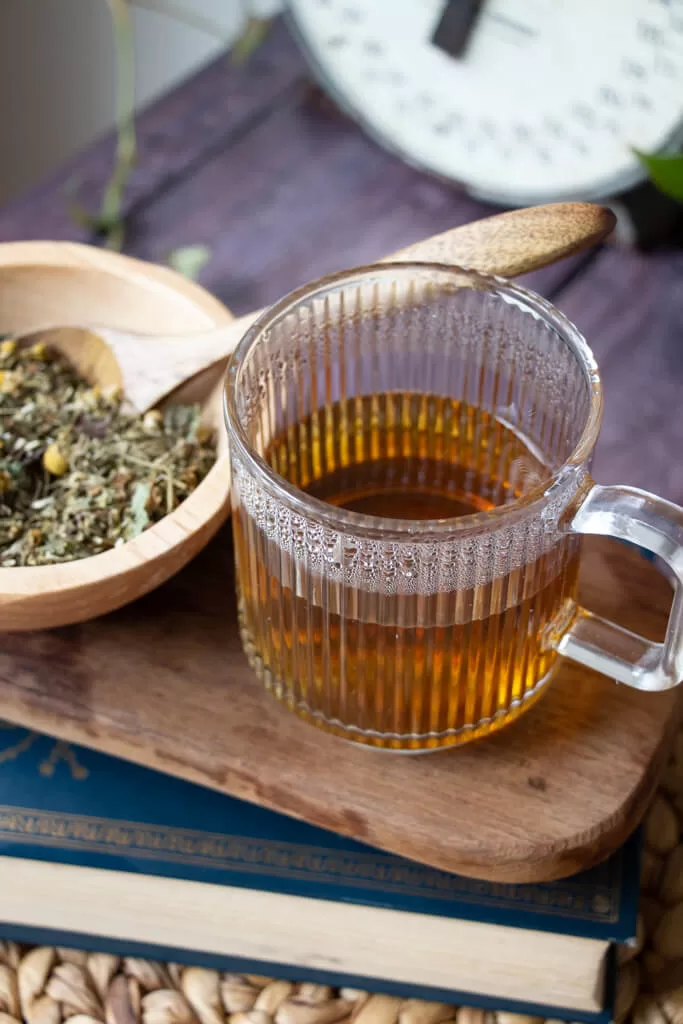
Common Causes of Headaches
Please note, while this tea blend is meant to help headache symptoms, it does not look at the root cause. There are many different types of headaches. Take a holistic approach alongside your health practitioner and find out the cause of your headaches.
Some common causes of headaches are:
- Tension headaches: These are the most common type of headache and are often caused by muscle tension in the head, neck, and shoulders.
- Migraines: Migraines are a type of headache that is often accompanied by other symptoms, such as nausea, sensitivity to light and sound, and visual disturbances. They are thought to be caused by changes in blood flow to the brain.
- Sinus headaches: Sinus headaches are caused by inflammation and pressure in the sinuses, often due to allergies, colds, or sinus infections.
- Cluster headaches: Cluster headaches are a rare but extremely painful type of headache that occur in cycles and can last for weeks or months at a time.
- Hormonal headaches: Changes in hormone levels, such as those that occur during menstruation, pregnancy, or menopause, can trigger headaches in some people.
- Caffeine withdrawal: If you consume a lot of caffeine and then suddenly stop, you may experience headaches as a withdrawal symptom.
- Dehydration: Not drinking enough water can cause headaches, especially if you are exercising or spending time in hot weather.
There are many other potential causes of headaches, and if you experience frequent or severe headaches, it’s important to consult with a healthcare professional to determine the underlying cause and develop an appropriate treatment plan.
Medical disclaimer: I am not a medical professional and I am not claiming that these herbs are a substitute for professional care. Always consult a professional for medical advice when starting natural remedies at home. These are just things that I use and love in my own home.
Herbal Tea for Headaches Recipe
My favorite place to buy herbs online is Starwest Botanicals. Each of the links below is an affiliate link, where I make a small commission from your purchase, at no additional cost to you.
Ingredients:

Don’t have all these herbs? No problem! Peppermint tea, feverfew tea, chamomile tea, or feverfew tea alone may help ease headache or migraine symptoms on their own.
Optional Additions: lavender, green tea, ginger root, turmeric
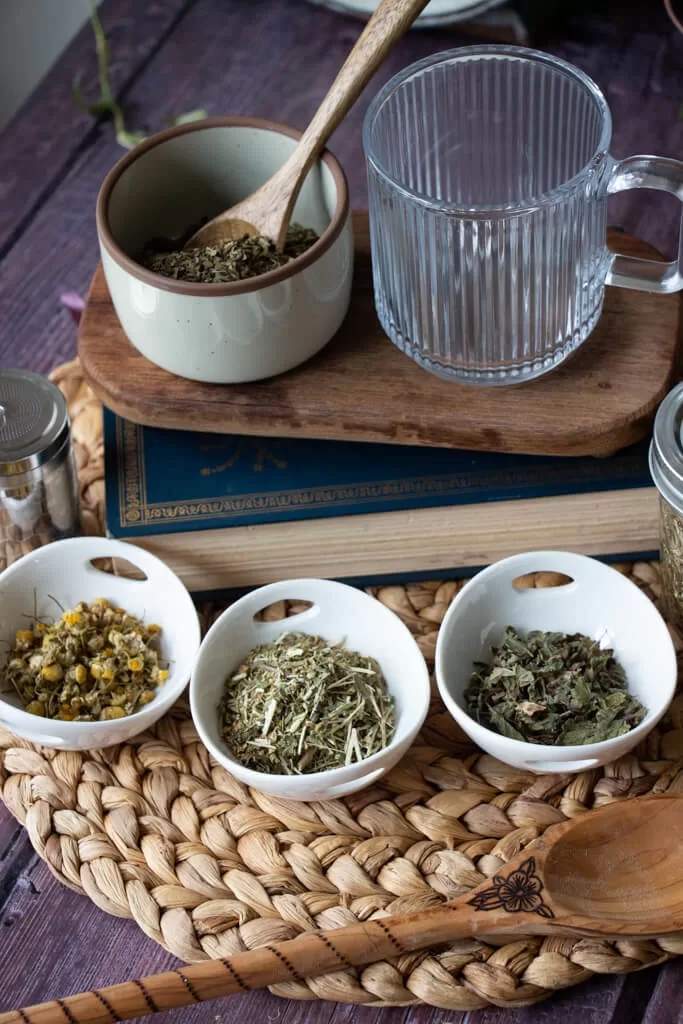
Chamomile alone is becoming my medicinal herb of choice for so many things! I always overlooked it because it is so common, but people love it for a reason! From pain relief to soothing skin, it really packs a punch for such a teeny little flower.
As an Amazon Associate, I earn from qualifying purchases. Please visit my privacy + disclosure page for more details.
Supplies:
How to Brew Herbal Tea
For detailed instructions on the methods for brewing herbal tea, check out my post: How to Brew Herbal Tea: Infusions and Decoctions.
Instructions:
- Mix all the herbs together in a bowl or jar.
- For each cup of tea, measure out 2 tbsp of the herbal mixture.
- Bring 1.5 cups of water to a boil in a small saucepan or tea kettle.
- Add the herbal mixture to your tea infuser or reusable tea bag.
- Pour hot water over your blend in the cup and cover. Let steep for 5-7 minutes.
- Remove infuser from mug and discard or compost spent herbs.
- Optionally, add honey or lemon to taste.
- Enjoy your tea!


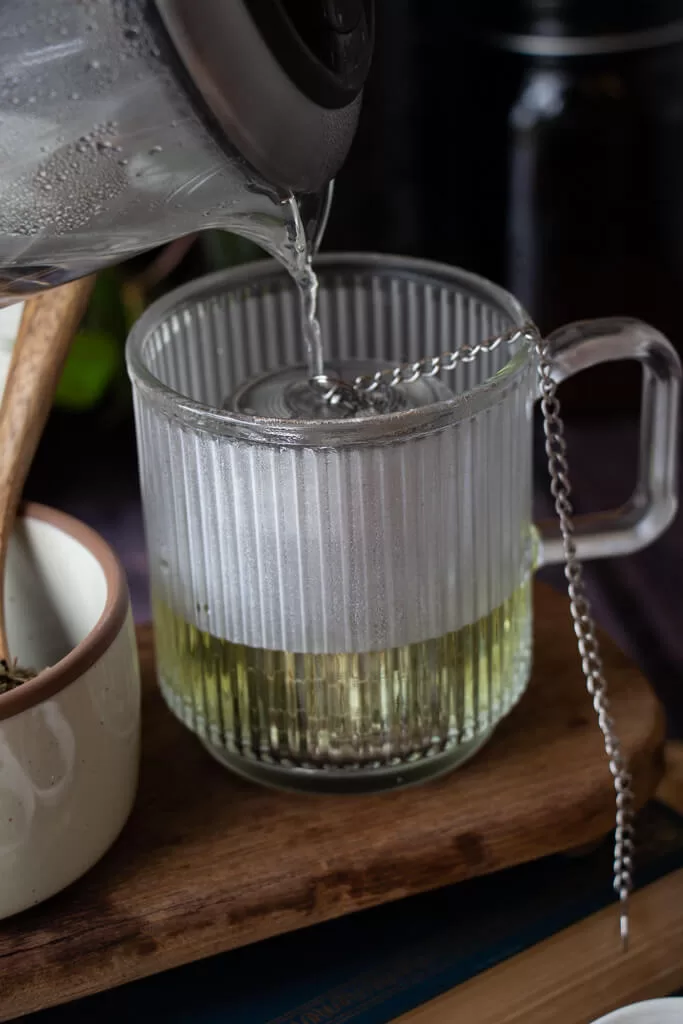

Dosage
It is recommended to consume no more than 3 cups of this herbal tea per day. Overconsumption of certain herbs can cause side effects, and it is important to follow the recommended dosage and consult with a healthcare provider if you have any concerns.
For detailed information on child dosage, check out this post on safe and effective herbs for kids. I personally would skip the feverfew in this recipe if using it for a child. Usually, the simpler the better.
Caffeine content – This herbal tea blend does not contain any caffeine, which makes it a great option for individuals who are sensitive to caffeine or who are looking for a caffeine-free alternative to traditional teas.

Storage
The tea blend can be stored in an airtight container in a cool, dry place for up to six months to maintain maximum freshness. It is important to store the tea away from direct sunlight, as exposure to light can cause the herbs to lose their potency.
Herbal Benefits for Headaches
Peppermint
Peppermint is known for its cooling and soothing properties. It contains menthol, which can help to relax tense muscles and reduce pain, including headaches.
Feverfew
Feverfew is an herb that has been traditionally used to treat migraines. It contains a compound called parthenolide, which may help to reduce inflammation and prevent the constriction of blood vessels in the brain, which can trigger migraines.
Chamomile
Chamomile is often used as a natural remedy for headaches and other types of pain. It has anti-inflammatory and muscle-relaxing properties, which can help to ease tension headaches in addition to its calming effect.
Lemon Balm
Lemon balm is a calming herb that has been used for centuries to promote relaxation and reduce stress. It may also have mild pain-relieving properties, which could help with headaches caused by tension or anxiety.

While herbs are a gentle way to ease your symptoms and heal the body, they may still have side effects. Herbal medicine is MEDICINE and should always be treated as such.
Try this herbal tea for headaches today!
Headaches can be caused by a variety of factors, from stress and tension to medical conditions and dehydration. Fortunately, there are many natural remedies that can help ease headache pain, and one of the best things you can do is reach for a warm cup of tea and give yourself time to relax.
Whether you suffer from tension headaches or migraine headaches, this tea blend will hopefully soothe your aching head and calm your frazzled nerves. Not only is a warm, soothing tea a great way to relax and unwind, it has far fewer side effects than over the counter pain relievers. So, the next time you feel a headache coming on, why not give your taste buds a treat and reach for a cup of this herbal tea for headaches? Your body and mind will thank you for it.
Other Natural Remedies for Headaches
- Aromatherapy: You can infuse herbs into olive oil to make a soothing peppermint oil or lavender oil for aromatherapy relief. You can also boil these herbs on the stove in a simmer pot.
- Acupuncture: Acupuncture is a traditional Chinese medicine technique that involves inserting fine needles into specific points on the body to alleviate pain and promote relaxation.
- Yoga and meditation: Practicing yoga and meditation can help reduce stress and tension, which are common triggers for headaches.
- Massage: Massaging the neck, shoulders, and head can help alleviate tension and promote relaxation, which can help relieve headache pain.
- Hydration: Drinking plenty of water and staying hydrated can help prevent dehydration-related headaches.
- Sleep: Getting enough restful sleep can help reduce the frequency and severity of headaches, especially tension headaches.
- Exercise: Regular exercise can help reduce stress, tension, and inflammation, all of which can contribute to headache pain.
Healing Herbal Teas with The Homestead Challenge
Looking for the right cup of tea? This post is part of a series about the best herbal tea blends for common ailments. Check out the herbal blends below!
- How to Brew Herbal Tea: Infusions and Decoctions
- Cold and Flu Tea
- Allergy Tea
- Marshmallow Root Tea
- Nausea Tea
- Anxiety Tea
- Energy Tea
- Hangover Tea
- Mugwort Tea
Pin Herbal Tea for Headaches Recipe for Later!
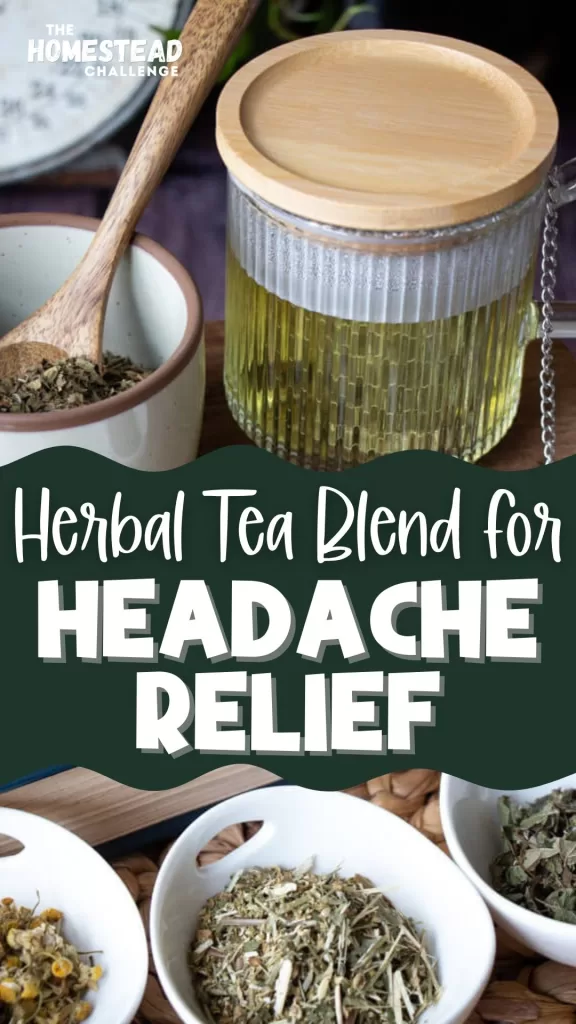

About the Author:
I’m Brittany, totally modern and mainstream turned crunchy mama!
Read more here about how I went from a totally incompetent cook and hyper-consumer to striving to live a more meaningful life from scratch.
I can’t wait to share my modern homesteading journey with you and I hope I inspire you to join along!
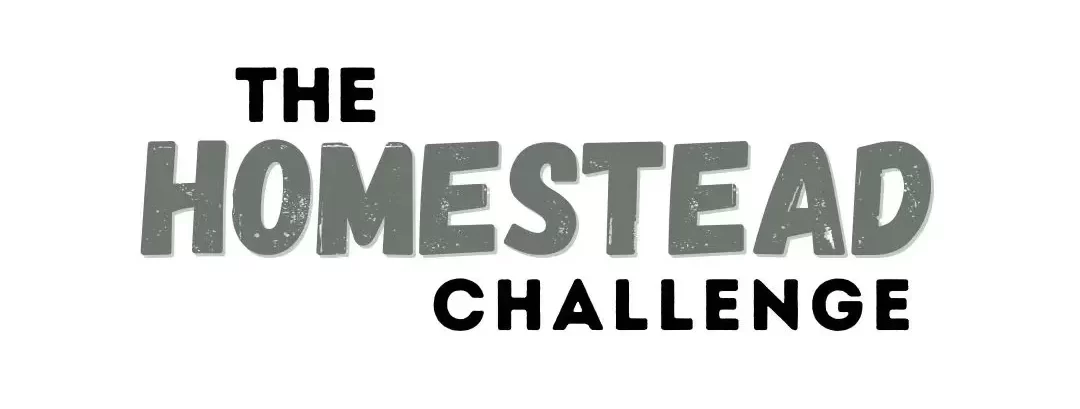

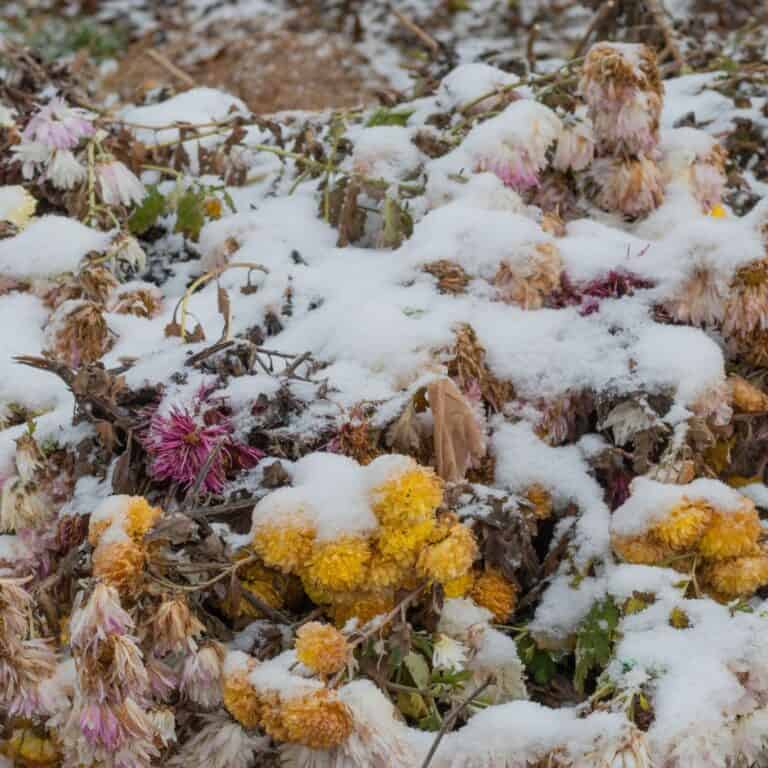

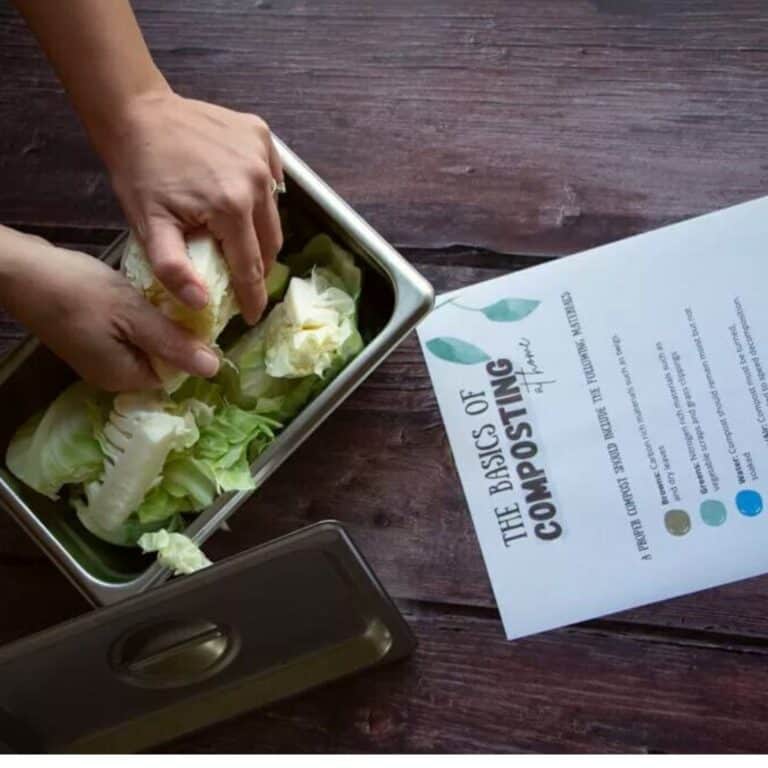


I should keep this blend on hand for the occasional headache.